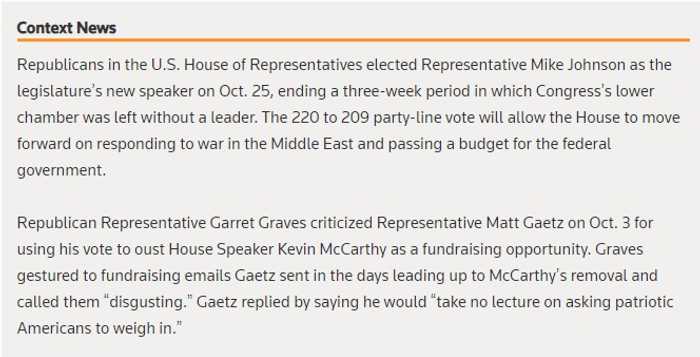Published 17:06 IST, October 29th 2023
Influencer model infects US political fundraising
The new way to create star power will continue to disrupt politics as it has Hollywood
-169857901847816_9.webp)
Political capital. U.S. politicians’ fundraising efforts are looking more fit for TikTok than a functional government. Viral posts and email blasts have bolstered donations for outspoken lawmakers, emboldening some of them to go rogue and contributing to the chaos that gripped the election of the House of Representatives' speaker this week. The new way to create star power will continue to disrupt politics as it has Hollywood.
The traditional process by which members of the Republican and Democratic parties choose their leaders resembles the machine that creates movie stars. Party organizers – like talent agencies – used to coalesce behind a candidate, often making a pick based on their gauge of how popular or capable a fundraiser that person might be. In turn, leaders like former Democratic House Speaker Nancy Pelosi or Republican Speaker Paul Ryan collected tens of millions of dollars to divert to politically valuable campaigns elsewhere in the party.
That has changed, partly because candidates can reach constituents on their own. Florida Republican Matt Gaetz has raised nearly $2 million this year, helped by fundraising emails sent in the lead-up to his successful effort to remove Republican Representative Kevin McCarthy as House speaker. Democrat Alexandria Ocasio-Cortez, who boasts more than 13 million followers on X, the platform formerly known as Twitter, has raised $3.5 million year-to-date. Vocal conservatives Marjorie Taylor Greene and Lauren Boebert have raised $2.7 million and $2.4 million, respectively, for their 2024 House campaigns.
Those sums to single members handily eclipse the $1.8 million that the average House candidate raised ahead of the 2022 elections, according to campaign finance tracker OpenSecrets. Party leaders’ fundraising roles are shrinking, too. McCarthy raised 2.9% of House Republicans’ cash in the 2022 elections. Had his share matched that achieved by his predecessor John Boehner in 2012, McCarthy would have had $6 million more to give vulnerable candidates. Nearly 70%, or $8.6 million, of Taylor Greene’s fundraising from January 2021 to the end of 2022 came from contributions smaller than $200.
McCarthy still raises more than his colleagues. Yet every dollar donated through a conservative hardliner’s email rather than through party-controlled channels left the former leader with less cash to spread around, while giving individual members more independence. When picking a new leader requires party unity, political influencers’ tactics are dangerous to subscribe to.

(Source: Reuters Breakingviews)
Updated 17:06 IST, October 29th 2023




